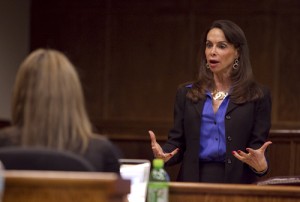Bringing the Law to Life: Professor Luz Nagle
“I want everyone to be engaged,” Professor Luz Nagle told a group of students gathered in the Mann Lounge in November at Stetson University College of Law in Gulfport.
Professor Nagle was introducing Luis Argueta, a documentary filmmaker and lecturer from Guatemala, who was visiting to talk with students about the plight of undocumented workers and the need to reform immigration laws. Nagle, whose career before teaching included serving as a judge in her native Colombia, is dedicated to raising Stetson students’ awareness about international human rights.
Professor Nagle serves as a mentor to third-year student Silvia Manzanero, who has worked as the professor’s research assistant and is taking her fourth class with the professor during her last semester at Stetson in the spring. As student president of Stetson’s International Law Students Association, Manzanero helped bring the filmmaker Argueta and other speakers to campus to explore a broad range of human rights topics. From genocide in Rwanda, to the latest revolution in the Arab world, to the ongoing struggle for the protection of women’s rights around the world, Manzanero described organizing the events as “one way of contributing to Stetson’s academic experience.”
Manzanero said in a recent interview, “When we practice law, we practice beyond the state of Florida.” In much the same way, Professor Nagle teaches beyond the classroom.
Professor Nagle brings international visitors from as far away as Yemen, Iraq, China and Argentina to participate in class with her students and introduces media such as video news and film clips to give greater impact to legal subjects. She also asks her students to think about the impact of their choices. In February, approaching Valentine’s Day, she urged students to consider the plight of children enslaved in the chocolate industry in the Ivory Coast.
“Employing a broad range of educational tools allows Professor Nagle to illustrate both the issue and how the law can affect people’s lives,” Manzanero explained. “When you see a child mutilated, or images of genocide, you see what really happened, how people’s lives were torn apart, why the law failed, and what needs to be done.”
Manzanero, who is originally from Spain and grew up during the country’s transition to democracy, said, “I see a law degree not as an end, but as an instrument to help improve the lives of others.” She said that Professor Nagle’s lectures inspire students, and show them ways in which they can help. Professor Nagle has high expectations of her students, Manzanero related.
In the four classes she’s taken with Nagle, Manzanero said that class participation is integral. In addition to lengthy and often complex casebook readings, Manzanero said that students are expected to read news and research current events related to legal cases, and to have a dialogue about the subject matter. Professor Nagle has the same level of commitment to class preparation and participation, Manzanero explained. “She is extremely prepared and always three steps ahead,” Manzanero said.
Professor Nagle is actively engaged in ending human trafficking and modern-day slavery, an advocate who takes part in the conversation about international human rights at conferences around the world. In December, before the Supreme Court of Justice in Brazil, she presented the prestigious Instituto Innovare Annual Award for innovation in the fight against organized crime. It was fitting for Professor Nagle to present this year’s award on behalf of the International Bar Association, as she fought organized crime herself while serving on the bench in Colombia during the reign of the Medellín drug cartel. The award went to the Permanent Group of Proactive Practice of the Brazilian National Attorney General’s Office.
A month prior, Professor Nagle was in Dubai, participating in the annual International Bar Association Conference. Over the summer, Professor Nagle was in Argentina, where she taught a class on the “disappeared.”
“When I saw she was teaching a class in Argentina, I instantly signed up,” said student Nash Licona. Professor Nagle also brought London-born journalist Robert Cox to speak to her class. Cox was editor-in-chief of the English newspaper, the Buenos Aires Herald, during the dictatorship in Argentina.
Thousands of people disappeared in Argentina during the regime of a brutal dictatorship, were brought to secret detention centers, and suffered torture and unknown fates.
“He saw everything that happened with a critical eye,” Licona explained of Cox’s coverage of the “disappeared.” “He saw where the rule of law failed.”
Licona, who has completed three classes with Professor Nagle and is enrolled in a fourth in the spring, said, “Her classes are not just about getting everyone talking. They’re about getting everyone to realize that they have something intelligent to say.”
Post date: March 1, 2012
Media contact: Kate Bradshaw
[email protected] | 727-430-1580
